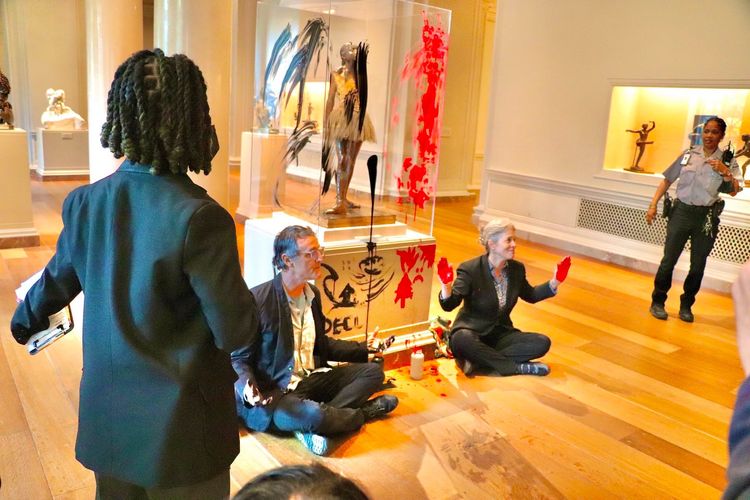The Climate Movement Needs to Hold Itself Accountable
The Climate Movement Needs to Hold Itself Accountable
By Amy Westervelt
For many, many—too many—years the consensus in the climate movement was that social justice issues (systemic racism, sexism, poverty, labor issues, really anything other than emissions and energy) were a "distraction" from the real work of fending off catastrophic climate change. We'll get to that later, they (usually white, affluent men) said.
During the Standing Rock protests of 2016, the mainstream climate movement finally started paying attention to the work frontline communities had been doing all along, and some folks realized a broader more inclusive movement was the way to actually win for a change. But not everyone was into it. As recently as 2019 some climate talking heads wondered aloud if things like the Green New Deal weren't "saddling the climate movement with a laundry list of other social programs" and thus turning off much-needed allies like moderate Democrats and Republicans (aka, educated, wealthy white people who don't historically line up to challenge the systems they benefit from).
This framing of inequality as a distraction rather than the root cause of the whole damn crisis, is a lot less common in the climate movement today. But don't celebrate just yet.
It's not gone, it's merely been replaced by a more genteel and thus more insidious version, what I've been calling the "united front" approach. In his book, The New Climate War, atmospheric scientist Michael Mann makes some valid points about the long history of propaganda in the U.S. (although he's far from the first to point that out), and argues that part of what he calls "the new denialism" is the fossil fuel industry sewing divisiveness in the climate movement. It's true, they have been! But while other climate folk (most recently climate scientist Katharine Hayhoe) have pointed to things like the spread of doomerism, Mann adds his old favorite target: "identity politics."
"The climate action deflectors," he argues, "are attempting to drive a wedge into pre-existing rifts within the climate community. That includes rifts arising from the ongoing debate over the role of personal behavior versus systemic change. (It also includes rifts involving the politics of identity, and matters of gender, age, and race.) When the climate discourse devolves into a shouting match over diet and travel choices, and becomes about personal purity, behavior-shaming, and virtue-signaling, we get a divided community unable to speak with a united voice. We lose. Fossil fuel interests win."
Whew that's quite the parenthetical aside! Some of this is very true, of course. I've documented myriad ways the fossil fuel industry tries to take advantage of weaknesses like racism and exploit them. But that's not an argument for not talking about race—it's the exact reason we must address systemic racism and how it shows up in climate spaces. Mann is far from alone in this sort of thinking, which is unfortunate because the idea that the way to get to a united voice is to simply stop disagreeing, to sidestep these longstanding issues altogether, is a far greater gift to the fossil fuel industry than what they might dare dream of.
This is not to say that there are no valid criticism of identity politics, particularly the idea that simply slotting in women or people of color to positions of power will automatically deliver wins (stares in Kyrsten Sinema). But that's not what Mann and his Mannions are talking about. As one acolyte put it recently (retweeted and amplified by Mann): "One of the climate inaction deflection tactics: making it an identity issue that polarizes the debate. Result: no policy, no progress - in spite of majority support for most common sense climate action policies." Translation: Stop talking about race so we can pass climate policy already!
The climate counter-movement is able to exploit these -isms because of the movement's refusal to deal with them, not because we're finally talking about it after 50 years. Advocating for more civil discourse amongst allies is one thing, but when it becomes "don't criticize me because we all need to be united against the real bad guys: Big Oil," then it's just another way to shut down the climate voices that are only beginning to find space in the movement. Fossil fuel interests win when we don't talk about it, actually.
I understand that conflict makes some people uncomfortable. And obviously I don't disagree that Big Oil are the bad guys but… how are you gonna hold them accountable when you can't even hold your friends accountable? Or take responsibility for your own shit? And why does just talking about race and gender and equality automatically mean arguing or a "shouting match"? Maybe it wouldn’t be a shouting match if some people would just learn to listen. We're not behind on climate because we're talking about race, if anything we wouldn't have the climate crisis without white supremacy and racialized capitalism before it, and the longer we ignore that, the longer it will be before we make progress.
This is this week's free story. The weekly digest is also included (scroll down). Upgrade to a paid subscription now for access to the other stories, and to support our work!
The Only Good Thing About 2021
By Mary Annaïse Heglar
There weren’t a lot of good things about 2021. It came in hot as the second year of a pandemic with an actual storming of the Capitol, in which we nearly saw elected officials publicly lynched and lost all democratic function. Then there were the skyrocketing temperatures and raging wildfires and storms, and even the OCEAN CATCHING FIRE. Among so, so many other things. But, here’s one good thing: the media is finally paying more attention to climate change.
Upgrade to a paid subscription now to keep reading.
All Science Matters
By Amy Westervelt
For the past decade or so, and especially in the last five years, the climate movement has come to realize that climate change is not a so-called "information deficit problem," solved by simply getting people data and information they might be missing. It is instead a question of political will. Which, you would think, would lead us straight to the question: okay, how do we build political will toward climate action? And for the answer to that, of course, the media and politicians have largely turned to…climate scientists. Um, what? Why?
Upgrade to a paid subscription now to keep reading.
Digest
Your weekly roundup of climate stories
Rising Temperatures, Rising Tides
The Maldives is being swallowed by the sea. Can it adapt? By Tristan McConnell for National Geographic
It was the fourth-warmest year on record in the US, and that's just one of several climate records set in 2021, by Dharna Noor for Boston Globe
It's Time to Nuke the Doomsday Clock ,by Brian Kahn and Caitlin McGarry for Earther
2021 was 45th year in a row with an above-average global temperature, by Rachel Ramirez for CNN
9 Cool Things That Got Way Too Hot Last Year, by Brian Kahn for Earther
Florida's Red Tides Are Getting Worse and May Be Hard to Control Because of Climate Change, by Aman Azhar for Inside Climate News
In parched Beijing, claims of a 'green' Olympics may not hold water, by Christian Shepherd for The Washington Post
Doomsday Glacier in Antarctica Could Collapse Soon: New Research, by Jeff Goodell for Rolling Stone
High winds topple trees and power lines, stoke fires across California, by Alex Wigglesworth for The LA Times
The Climate Presidency?
Norway's Big Lesson for Build Back Better, by Kate Aronoff for The New Republic
'Build Back Better' Hit a Wall, but Climate Action Could Move Forward, by Coral Davenport and Lisa Friedman for The New York Times
No. 2 US climate diplomat leaves after a year under Biden, by Ellen Knickemeyer for AP
Biden administration proposes updates to mobile home energy-efficiency - The Washington Post
Biden may break climate provisions out of Build Back Better, by Dharna Noor for Boston Globe
This 'super-freshman' is making a mark on climate policy in the House, by Maxine Joselow for The Washington Post
Biden's Inauguration Anniversary: Has He Kept His Campaign Promises? by Alexa Stevens for Teen Vogue
State Senator Alessandra Biaggi on Why We Need the Fashion Act, by Veronique Hyland for Elle
Climate Accountability
Judge: Energy Transfer Can't Keep Pipeline Records Secret, by Aleen Brown for The Intercept
How Exxon is using an unusual law to intimidate critics over its climate denial | Environment, by Chris McGreal for The Guardian
Shell CCS Plant Emits More Greenhouse Gases Than It's Captured, by Molly Taft for Earther
Abandoned oil well counts are exploding — now that there's money on the table, by Naveena Sadasivam for Grist
House panel asks Big Oil board members to testify about climate disinformation, by Maxine Joselow for The Washington Post
China Moves to Freeze Production of Climate Super-Pollutants But Lacks a System to Monitor Emissions, by Phil McKenna for Inside Climate News
The US Military Emits More Carbon Dioxide Into the Atmosphere Than Entire Countries Like Denmark or Portugal, by Sonner Kehrt for Inside Climate News
Scientists target PR and ad firms they accuse of spreading disinformation, by Valerie Volcovici for Reuters
Justice Is Justice Is Justice
Report: Climate disasters have a devastating effect on US students, by Yvette Cabrera for Grist
Dolores Huerta: Workers Must Unite to Take on Climate, by Yessenia Funes for Atmos
Shell's Massive Carbon Capture Plant Is Emitting More Than It's Capturing, by Anya Zoledziowski for Vice
Climate change is coming for Indonesia's cocoa farms; candy companies aren't helping, by Nikita Amir for Popular Science
An endangered wolf went in search of a mate. The border wall blocked him, by Douglas Main for National Geographic
Decolonizing Conservation: Native Communities Know How to Protect Nature , by Kate Wheeling for Teen Vogue
How Africa's First Heat Officer Confronts Climate Change - Bloomberg, by Peter Yeung for Bloomberg CityLab
Del Rio and the Call for Migrant Justice , by Alicia Schmidt Camacho for The New Yorker
Inspired by King's Words, Experts Say the Fight for Climate Justice Anywhere is a Fight for Climate Justice Everywhere, by James Bruggers for Inside Climate News
Climate change makes it deadlier to cross the US-Mexico border, by Angely Mercado for Popular Science
Glimmers of Hope
Sprawling Coral Reef Resembling Roses Is Discovered Off Tahiti, by Neil Vigdor for The New York Times
How “mechanical trees” could solve a huge climate change problem, by Klaus Lackner for Inverse
Minerals and the clean-energy transition: the basics, by David Roberts for Volts
This map may make you feel better about the state of the planet, by Benji Jones for Vox
Give the US Postal Service $3 Billion to Electrify Its Fleet, You Cowards, by Brian Kahn for Earther
The Simplest Way to Sell More Electric Cars in America, by Robinson Meyer for The Atlantic
Inside Finland's Plan to End All Waste by 2050, by Lisa Abend for Time
The Surprisingly Low Price Tag on Preventing Climate Disaster , by Yuval Noah Harari for Time
Los Angeles may ban urban oil and gas fields after decades of complaints - AP
Climate in Culture
Brutes by Amitav Ghosh for Orion
Mapping Climate Grief, One Pixel at a Time, by Julian Lucas for The New Yorker
Plus More
Chemical pollution has passed safe limit for humanity, say scientists, by Damien Carrington for The Guardian
Should the world ban solar geoengineering? 60 experts say yes, by Shannon Osaka for Grist
Why We've Succumbed to Pandemic Apathy, by Marion Renault for The New Republic
How a Married Undercover Cop Having Sex With Activists Killed a Climate Movement, by Geoff Dembicki for Vice
The 17th Day, by Christina Rivera Cogswell for Terrain





Only paid subscribers can comment.
Please subscribe or sign in to join the conversation.